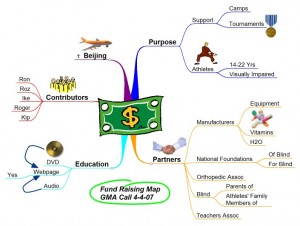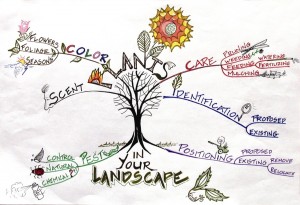An Idea Mapping Success Blogs Weblog
Idea Map #7a – Fund Raising
5 Apr 2007 Author: Jamie Nast In: Idea Mapping ExampleLast night during Roger C. Parker’s GMA (Guerrilla Marketing Association) call, we created an idea map as a group. Ron offered the topic of raising funds to support athletes who are visually impaired. Some of the other callers also contributed suggestions.
This map is a work-in-process as last night’s callers volunteered to provide additional information.
Ron – I heard you say something about Beijing. Is that one of the locations where the athletes compete or one of the camps?
Looking forward to adding more data to our map! I’ll post a revised version once I have more of your input.
Hint #4 – How Much Detail Should I Put in My Idea Map?
3 Apr 2007 Author: Jamie Nast In: Helpful HintsNearly every workshop participant struggles with this question at some point. Here are some suggestions.
- Before starting your map, determine the purpose of your map. Your purpose will be the main driver in the amount of detail you collect. (For example, is the map for you or will it be shared? Are you doing a brainstorm or is this information you need to learn/memorize? Will you be tested on the information?)
- Only include enough detail to enable you to remember the information you need. Often we include too much detail because we don’t trust our memories.
- A picture can represent a thousand words, so remember to include them as well.
If you have a question or a struggle with your Idea Maps, reply to this post or send me a note via my contact form.
Guerrilla Marketing Association Call Reminder
2 Apr 2007 Author: Jamie Nast In: Radio/TV AppearancesReaders of Idea Mapping are invited to join a special Guerrilla Marketing Association (GMA) call hosted by world-renowned Roger C. Parker, author of 38 books. Normally you must be a GMA member to participate in this call, so take advantage of this one-time opportunity. On April 4, 2007 from 7-8 PM EST Jamie Nast will be Roger’s guest. To join Roger and Jamie, call 1-404-920-6610 and use the pin 192304#.
Idea Map #6 – Plants
1 Apr 2007 Author: Jamie Nast In: Certified Idea Mapping Instructors, Idea Mapping Example, Kaizad IraniKaizad Irani, a Certified Idea Mapping Instructor and a professor from Parkland College in Illinois, created this idea map for his students. Kaizad teaches landscape architecture and uses idea maps frequently to enhance his students’ learning experiences.
Idea Mapping Book Goes into the 3rd Print Run
28 Mar 2007 Author: Jamie Nast In: idea mapping bookThe 3rd print run for the Idea Mapping book is planned for approximately April 20, 2007. I couldn’t be happier that readers are finding such value in this tool and this book.
- 0 Comments
- Tags: idea mapping book
Hint #3 – Don’t Get Caught in the 1-Word Per Line Trap
27 Mar 2007 Author: Jamie Nast In: Differences Between Idea Mapping and Mind MappingIdea Mapping has a rich heritage in mind mapping. Mind mapping is governed by a set of strict laws — each of which have merit in certain situations. For 15 years I’ve seen professionals struggle with trying to stick to using one word per branch. Mappers were frustrated and didn’t understand the rigidness of this law. In certain circumstances they would give up on this tool over this one issue.
That’s why I use the term “Idea Mapping”. Idea maps don’t restrict you to the laws of mind maps, and there is freedom to make an informed choice knowing when (on rare occasion) it is beneficial to follow a rule. So when should you use a single word?
- I think the first answer is that the fewer words you can use and still remember the meaning — the better. It saves space, teaches you to trust your memory, and makes the map less cluttered. This allows you to see interconnections more clearly.
- Secondly, keep in mind that a single word will generate more thoughts than a phrase. A phrase will narrow subsequent associations. So if you have a very broad topic on which you need to brainstorm, single key words might be useful. But my experience has taught me that most brainstorming topics in the business world are specific and need definition, not just a key word.
So although I understand the reasoning behind using single key words, the bottom line is that idea mappers should use as many words as necessary for the purpose of their application. Don’t let some rule stand in the way of success.
A few days ago I got an unusual call asking me to create a map for this person’s friend who was diagnosed with terminal cancer. I called it a “Celebration of Life” map. One of my Certified Idea Mapping Instructors, Liza Jennings Seiner, was a perfect fit for this assignment. If the family permits, I’ll share the actual map when it is done. Meantime, consider this application if you find the need to celebrate someone’s life in this unusual way.
Live Idea Mapping – An Advanced Application
25 Mar 2007 Author: Jamie Nast In: Idea Mapping Example, Real-Time Idea MapsOn Friday March 23rd I joined forces with a long-time client of mine. She is an IT Systems Thinking expert in a large automotive company in southeastern Michigan. Her job was to facilitate an internal organization through a 4.5-hour process that analyzed where they were at today and how they would co-create their future. I’m guessing there were somewhere between 200-250 leaders in attendance.
Afterwards, the entire group had an opportunity to share outcomes, responses, and their thoughts going forward. My role at this point was to create 3 Idea Maps as the group responded to 3 different questions. The idea maps were created live using MindManager software and projected on a huge screen at the front of the room so that the participants could see it grow in the moment. No one in the room had seen this method of capturing data. I made jpgs of the maps and they will be distributed to all of the participants as part of the meeting follow-up and next steps. In my book I call this “Real-Time Idea Mapping”.
I highly recommend this technique for those of you who feel very comfortable with your idea-mapping skills. I’ve done this live using hand-drawn maps as well, but in this instance there was no way for the group to see the outcome without projecting the maps. My only suggestion when capturing data live is that you need to move FAST and it helps if you can have one additional person sitting next to you who might hear something you don’t because the information comes at you so quickly. Those issues discussed in the meeting will be more memorable as a result of using this tool. Due to the proprietary nature of the content, I can’t share these examples, sorry.
Register Today for the Idea Mapping Workshop in Santa Barbara, CA – May 1&2
19 Mar 2007 Author: Jamie Nast In: Idea Mapping WorkshopsJamie Nast will teach a 2-day Idea Mapping Workshop in Santa Barbara, CA on May 1&2, 2007 from 8:30am – 5:00pm both days. See a workshop abstract or register for this event today.
Article – “Making a Mental Athlete”
18 Mar 2007 Author: Jamie Nast In: MemoryABC News 20/20 posted a 4-page article providing much of the text connected with Friday night’s broadcast. Click here if you are interested.
- 0 Comments
- Tags: Memory, Memory Championship
Idea Mapping Blog
The purpose of this blog is to share idea mapping examples and related learning from my Idea Mapping, Memory, Speed Reading, and Certification Workshops. This blog is dedicated to my Certified Idea Mapping Instructors, my clients, Mind Mapping and Idea Mapping practitioners around the globe.

![[Ask]](http://ideamapping.ideamappingsuccess.com/IdeaMappingBlogs/wp-content/plugins/bookmarkify/ask.png)
![[del.icio.us]](http://ideamapping.ideamappingsuccess.com/IdeaMappingBlogs/wp-content/plugins/bookmarkify/delicious.png)
![[Digg]](http://ideamapping.ideamappingsuccess.com/IdeaMappingBlogs/wp-content/plugins/bookmarkify/digg.png)
![[Facebook]](http://ideamapping.ideamappingsuccess.com/IdeaMappingBlogs/wp-content/plugins/bookmarkify/facebook.png)
![[Google]](http://ideamapping.ideamappingsuccess.com/IdeaMappingBlogs/wp-content/plugins/bookmarkify/google.png)
![[MySpace]](http://ideamapping.ideamappingsuccess.com/IdeaMappingBlogs/wp-content/plugins/bookmarkify/myspace.png)
![[Slashdot]](http://ideamapping.ideamappingsuccess.com/IdeaMappingBlogs/wp-content/plugins/bookmarkify/slashdot.png)
![[Sphinn]](http://ideamapping.ideamappingsuccess.com/IdeaMappingBlogs/wp-content/plugins/bookmarkify/sphinn.png)
![[StumbleUpon]](http://ideamapping.ideamappingsuccess.com/IdeaMappingBlogs/wp-content/plugins/bookmarkify/stumbleupon.png)
![[Technorati]](http://ideamapping.ideamappingsuccess.com/IdeaMappingBlogs/wp-content/plugins/bookmarkify/technorati.png)
![[ThisNext]](http://ideamapping.ideamappingsuccess.com/IdeaMappingBlogs/wp-content/plugins/bookmarkify/thisnext.png)
![[Twitter]](http://ideamapping.ideamappingsuccess.com/IdeaMappingBlogs/wp-content/plugins/bookmarkify/twitter.png)
![[Webride]](http://ideamapping.ideamappingsuccess.com/IdeaMappingBlogs/wp-content/plugins/bookmarkify/webride.png)
![[Email]](http://ideamapping.ideamappingsuccess.com/IdeaMappingBlogs/wp-content/plugins/bookmarkify/email.png)
